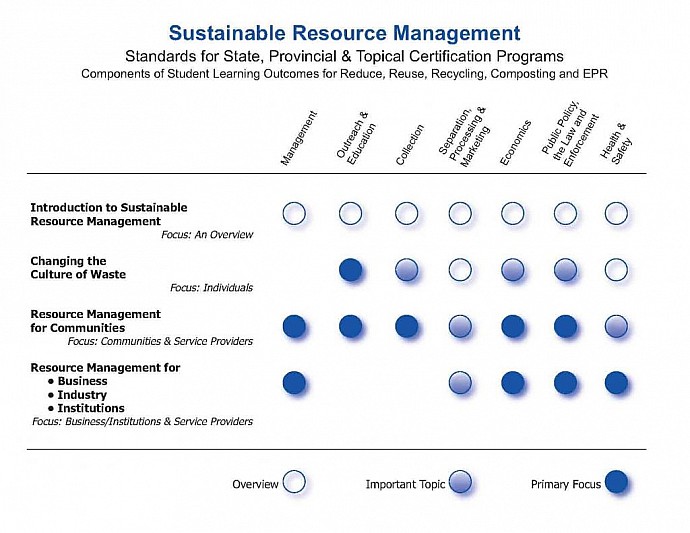August 27, 2013
Following several years of discussion and input from a broad spectrum of stakeholders, a national certification program has been established for professional training programs for Certified Sustainable Resource Management Professionals in waste reduction, reuse, recycling, composting, and zero waste. The program complements existing training programs, offers pathways for experienced professionals, and enables higher education to contribute to the expansion of the sustainable resource management industry.
As environmentally-sound waste and resource management becomes a higher priority for local governments, businesses, and institutions, a well-trained pool of Sustainable Resource Management professionals becomes even more important. Certification provides emerging as well as accomplished professionals with the means to distinguish themselves from others in the field. By improving the overall knowledge and understanding of workers in the industry, certification programs help increase the credibility and level of competence in the field. National standards will serve to add credibility to the title “Recycling Professional” and helps to foster a standard level of competence. Creating a National Standard provides for a national certification that allows for transferability within and between states with universal credibility, with programs held to a high and consistent standard, and it allows state, provincial or topical focus while still providing general uniformity.
The move toward establishing national standards was started in 2008 with initial discussions at the National Recycling Coalition’s Recycling Organizations Council (ROC). The Recycling Organizations of North America (RONA) continued that effort in 2009 and in 2012 when it surveyed state recycling training programs. Between 2009 and 2013, RONA held stakeholder meetings and received a United States Department of Labor Community Based Job Training (CBJT) grant to continue the effort and hold key stakeholder meetings in Santa Monica and Washington, DC on the subject of creating national standards. In August 2011, RONA adopted a Plan for Certifying Sustainable Resource Management Training Programs and Professionals.
Development of this national certification program has been led by a National Standards Certification Board (NSCB), appointed in January, 2012 by the Recycling Organizations of North America (RONA).
The NSCB Board consists of the following members:
- Athena Lee Bradley, Northeast Recycling Council
- MaryEllen Etienne, Reuse Alliance
- John Frederick, Intermunicipal Relations Committee, Pennsylvania
- Judi Gregory, California Resource Recovery Association
- Bert Jacobson, Kankakee Community College & Illinois Recycling Association
- Marie Kruzan, Association of New Jersey Recyclers
- Gary Liss, GrassRoots Recycling Network
- Cary Oshins, US Composting Council
- Joanne Shafer, Centre County Recycling & Refuse Authority (Pennsylvania) & Professional Recyclers of Pennsylvania
An NSCB Advisory Committee was also established to assist in the process. Members include:
- Sue Beets – SBM Management
- Joseph Floyd – University of Florida
- Lisa Friend – Boulder County (Colorado) Commissioner Office
- Celeste Johnson – Reinventing Stamford
- Russell Klein – Washington D.C. Department of Public Works
- Rachel Leven – Duke University
- Courtney Lindberg – City of Ventura (California)
- Bruce Olszewski –San Jose State University
- Joel Ostroff – Macon County (North Carolina) Solid Waste Management
- Carol Pepper-Kittredge – Sierra College
- Dawn Quirk – Tufts University
- English Bird – New Mexico Recycling Coalition
|
The goals of NSCB and Advisory Committee are to:
|
The NSCB will accredit certification programs run by states, regions, organizations, trade associations, universities, and community colleges. Learning outcomes achieved through the certification program include: a command of the technical language and the tools employed to eliminate waste, reuse products and packaging, and use resources efficiently; ability to incorporate applicable laws, regulations and policies; economically sound business practices; health and safety regulations and best practices into everyday resource management work; and, developing effective outreach campaign strategies and techniques to support and measure local economic development and job creation.
 Organizations operating certification programs must demonstrate minimum requirements in their training programs, including:
Organizations operating certification programs must demonstrate minimum requirements in their training programs, including:
- A minimum of 30 hours of course work;
- Certification by an accredited postsecondary institution;
- A comprehensive course on Sustainable Resource Management;
- Progressive proficiency exams as well as a comprehensive written exam to demonstrate proficiency
- A recertification process; and,
- Establishment of an Alternate Certification Pathway to allow experienced professionals to be credited with knowledge they have gained outside the formal training process.
Additionally, Program Administration must include the following:
- Program Administrator or Team
- A broad-based Certification Committee, including representatives from at least six of the following: state recycling organization, municipal and regional recyclers, accredited postsecondary institution, reuse industry, recycling industry, composting industry, corporate environmental management, and/or state government
- Required Policies and Procedures
- Defined instructor criteria
- Student evaluations
- Annual program review and update
Adoption of the National Standards is already underway. Illinois developed the first training program based on National Standards with small grant to Kankakee Community College. The program is set to launch on-line in the spring of 2014. New Mexico conducted a six hour class in June to complement its existing 24-hour required training for facility operators based on National Standards. More than twenty people in the state are in line to become Nationally Certified.


Comments (0)
Add a Comment